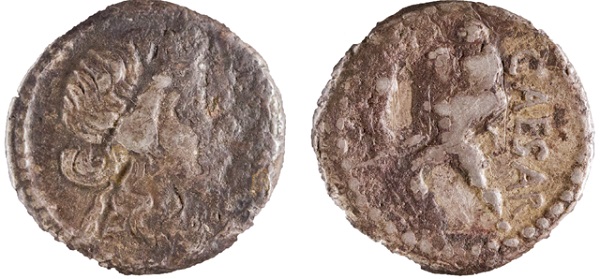
January 10, 2015, by Esther Eidinow
Caesar Crosses the Rubicon!
As part of the Nottingham ‘Anniversaries through Coins’ project, Michael Welbourn reports how, on this day the tenth of January, in 49 BC, Julius Caesar crossed the river Rubicon and precipitated the final crisis of the Roman republic.
Tracing the roots of this momentous decision requires us to go back eleven years to 60 BC. In that year Caesar entered into an informal political alliance with two of the most influential men of the day: Marcus Licinius Crassus (who was extremely wealthy) and, more famously, Pompey the Great. This alliance is often called in modern times the First Triumvirate.
It was arranged that Caesar would be elected consul for the following year, and use his position to the mutual advantage of the triumvirs. Pompey in particular wanted his settlement of the East (from where he had recently returned) to be ratified. He also wanted land to be granted to his veterans.
Caesar used his consulship to procure both the ratification of Pompey’s eastern settlement and the passage of an agrarian law which granted land not only to Pompey’s veterans, but to the poorer classes generally. This law was fervently resisted by the politically conservative senators and aristocrats, but at a meeting of the populace Caesar appeared flanked by his two allies who voiced their support for the law. It was duly passed.
It was also arranged that for his proconsular command (beginning in 58 BC), Caesar should be given the provinces of the Gauls and Illyria for five years. This position was renewed in 54 BC for another five years. Caesar seized the opportunity thus afforded, stepping beyond the bounds of his Gallic provinces to conquer the rest of Gaul — in the process earning for himself both vast wealth and a reputation that outshone even that of Pompey.
During his years as a proconsul, the bonds between Crassus, Pompey, and Caesar had begun to weaken for a variety of reasons. In 53 BC Crassus was killed during his campaign against the Parthian empire. In addition, a year earlier Caesar’s daughter Julia, whom he had married to Pompey, died in childbirth severing what had by all accounts been a strong familial link between the two men (Pompey is said to have been genuinely and deeply in love with Julia).
But what truly seems to have triggered Caesar’s crossing of the Rubicon was the use his political opponents made of the reputation he had earned in Gaul. He had come to overshadow Pompey in terms of popular esteem, and his enemies (perhaps especially Cato the Younger, who had been one of his most long-standing foes) used Pompey’s concerns in this regard to bring him over to their side.
Pompey, who had become jealous and suspicious of Caesar, rescinded a law passed in 52 BC which allowed Caesar the extraordinary right to stand for a second consulship without having to return to Rome personally to campaign. However, a candidate for office could not enter the city under arms. This meant that Caesar would have to give up his command and return to Rome as a private citizen in order to stand for his next consulship.
Caesar, however, well aware that his enemies would use his status as a private citizen to prosecute him – and so destroy his reputation and his prospects for further power and glory – needed a seamless transition from proconsular command to consulship, since holding office granted an individual immunity from prosecution for the duration of their tenure.
In order to expedite Caesar’s transition back to private citizen his enemies in the senate began to agitate for the termination of his proconsular command (not due to end until 49 BC) and his recall to Rome. If he would not abide by the terms of such a decree he would be branded a public enemy. In this they had Pompey’s support.
Caesar had been robbed of the electoral privilege which would have protected him from prosecution. His enemies urged Pompey to gather his veterans together to form an army. Only one course of viable action remained to him: invade Italy.
As the situation escalated, Caesar attempted negotiation, offering to lay down command of his army if Pompey would do the same. All attempts at mediation were blocked by his enemies. Trapped, Caesar had no choice but to defend himself by force, and on 10 January 49 he marched one of his legions across the river Rubicon – the border of ancient Italy – and began making his way to Rome, a journey which would precipitate his ascendancy as dictator, and the fall of the Republic.
Image by Kelly Grimshaw: AR denarius of Caesar. Obverse diademed head of Venus right. Reverse has CAESAR; Aeneas fleeing leftward with his father on his back, carrying palladium. 3.42g, 18mm, 12 o’clock.
Coin courtesy of The University of Nottingham Museum.
No comments yet, fill out a comment to be the first

Leave a Reply